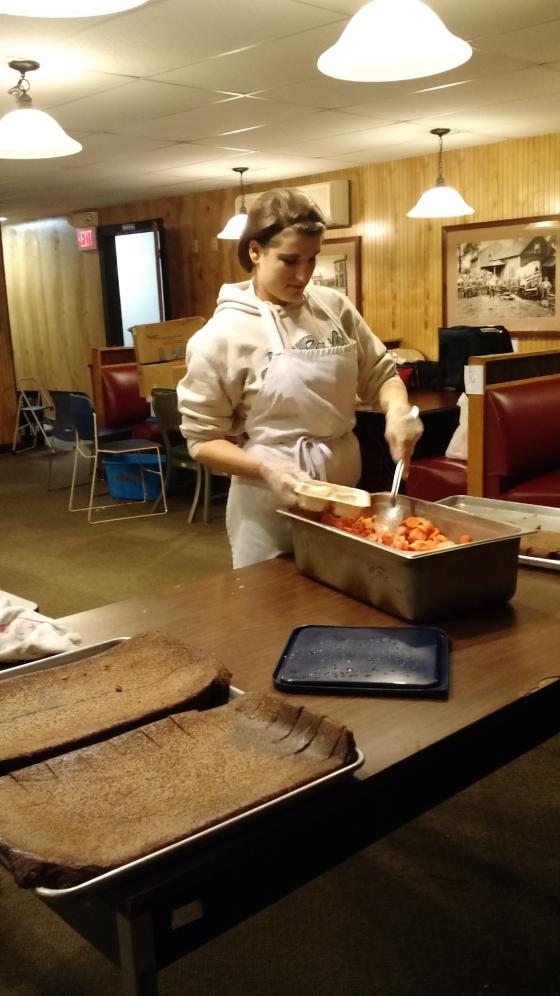Posted March 17, 2022 at 10:36am by Anonymous (not verified)
Food Justice on the Menu in the NEK

Written by Taylar Foster
The Northeast Kingdom Food System Plan was re-released in December of 2016, marking a substantive update to Vermont’s only regional food system plan. The Center for an Agricultural Economy, the Northeastern Vermont Development Association, and a steering committee composed of Northeast Kingdom cross industry experts and social service sectors guided plan development.
The NEK food system plan is structured around eleven discrete goals, all of which align with and support the goals of Vermont’s statewide Farm to Plate food system plan. One of the goals of the NEK plan addresses food security and food justice. The following case study provides a replicable model for securing access to fresh, nutritionally balanced food (aligns with the Farm to Plate food access goal) and building a skilled workforce with access to livable wages and welcoming work conditions (aligns with the Farm to Plate livable wages and safe workplace goal).
Cornucopia is a culinary arts and hospitality training program run by Umbrella NEK, a non-profit dedicated to improving the lives of women surviving domestic abuse and in transition. The program runs three times a year in 17-week increments. During the first four weeks, participants learn job readiness essentials such as writing a resume, interview skills, and the role of the tourism industry in the NEK’s economy. For the next 13-weeks, participants are in the kitchen under the guidance of a professional chef.
Cornucopia cooks for the Meals on Wheels program for Newport area residents, and on Fridays, Cornucopia runs a community lunch. The two programs give Cornucopia participants experience in kitchen essentials such as knife skills, cooking and baking, safety, and sanitation as well as hospitality skills greeting, serving, and working the lunch floor.
Five people can participate per session, with about a 75% graduation rate. Many women go on to further education programs, either obtaining their GED, enrolling in the Community College of Vermont, or other tertiary education programs. Some graduates go directly into the workforce. As the NEK’s service sector continues to grow, filling vacant positions with women who may not otherwise have had the opportunity to apply is a win-win situation for all.
Cornucopia contributes to the food system in another way: it is a member of the Vermont Fresh Network, a statewide partnership of farmers, food producers, and chefs to improve the relationship between producers and consumers to eat more locally grown and produced food.
The biggest challenge for the program is funding. Cornucopia relies on a basket of diverse funding sources, much of which comes from the Economic Services Division of the Vermont Agency of Human Services. The Vermont Department of Labor helps pay the stipends for trainees. The Vermont Council on Aging pays for the food for Meals on Wheels, but the number of meals prepared is determined by the cost of food and the food budget. Some years there is less money for food, which means fewer meals are prepared for residents. The Friday lunches bring in some funds but payment is by donation.
Program Manager Vaunne Masse sees the reality of hunger every day, in both her program participants and in those who rely on Cornucopia for meals. Many of the women she works with find eating a piece of fruit a luxury, something that they know is important to eat but is out of their normal budget.
It is not that the participants do not understand the benefits of healthy eating. They simply cannot afford certain food items. Masse puts a challenge back to the greater community to challenge the assumptions that people who are low-income do not care about eating well. All too often, she sees women of all ages get caught in a spiral effect of poor health from poor eating habits due to lack of income, which is further fueled by lack of sufficient, affordable transportation. “Access is not the problem, it’s the justice piece we need to work on,” said Masse, acknowledging that many area stores and markets have made fresh fruits and vegetables available. The barrier is affordability.
Umbrella is already hoping it can replicate what it has done so far with Cornucopia in Newport. Umbrella is in the works of offering a second Cornucopia program in Saint Johnsbury. The ability to replicate is largely limited by the ability to access funds. Cornucopia is exploring a for-market product to provide a consistent revenue source.
Many employers throughout Vermont recognize gaps in the workforce of job readiness skills. Programs like Cornucopia seek to fill those gaps. Creative partnerships and funding options are critical to meeting present and future workforce needs.
Learn more about the NEK Food System Plan through the Northeastern Vermont Development Association at www.nvda.net/agriculture and learn more about Umbrella and its programs at www.umbrellanek.org.
